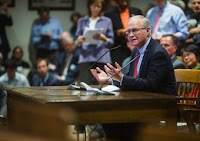"We have to step up our fight against climate change," Massachusetts state Sen. Michael Barrett told a packed committee hearing in Boston on Tuesday. Barrett's solution: put a price on carbon.
Barrett laid out his plan in Senate Bill S.1747, one of two carbon price options before the legislature. Massachusetts joins five other states—Connecticut, Oregon, Rhode Island, Vermont and Washington—with proposed legislation exploring this option for cutting greenhouse gas emissions.
Although the idea of a carbon price is not new, it is increasingly seen as a key climate solution in the leadup to the U.N. climate talks in Paris in December. Six major oil and gas companies, including BP, Shell and Statoil, have said they support carbon pricing. In recent weeks, Germany's Chancellor Angela Merkel and Norwegian Prime Minister Erna Solberg voiced support for a global price on carbon. So have the heads of the World Bank and International Monetary Fund, along with many global leaders in business and politics.
Responding to such calls for action, U.N. climate chief Christiana Figueres said on Tuesday that pricing carbon will not be part of the upcoming climate treaty; but she expressed optimism that it will happen in the future.
"The idea of putting a price on carbon is catching fire as one of the best ways we can cut emissions and deal with the worst effects of climate change," Kenneth Kimmell, president of the Union of Concerned Scientists, a climate research and communications nonprofit told InsideClimate News. "I do think the Paris agreement is going to galvanize that further.
"People have to recognize that right now, fossil fuels are getting an enormous subsidy because the harm of their emissions are not being captured in their price."
Carbon pricing, whether through a cap-and-trade program, a carbon tax or carbon fee, seeks to encourage communities, organizations, even individuals to use less carbon-intensive energy sources by raising the prices of fossil fuels to reflect their associated carbon pollution.
Massachusetts has already been pricing carbon for the electricity sector for more than five years through a cap-and-trade program called the Regional Greenhouse Gas Initiative, or RGGI. It involves a regional carbon cap and a market for its nine member states to sell and purchase carbon credits.
But for Massachusetts, the power sector accounts for only 20 percent of the state’s emissions; the remaining 80 percent comes from sources not covered under RGGI––such as heating fuels, construction, transportation and manufacturing. The new carbon pricing proposals aim to fill that gap.
Read more at Massachusetts Mulls an Economy-Wide Price on Carbon

Hello Everybody,
ReplyDeleteMy name is Mrs Sharon Sim. I live in Singapore and i am a happy woman today? and i told my self that any lender that rescue my family from our poor situation, i will refer any person that is looking for loan to him, he gave me happiness to me and my family, i was in need of a loan of S$250,000.00 to start my life all over as i am a single mother with 3 kids I met this honest and GOD fearing man loan lender that help me with a loan of S$250,000.00 SG. Dollar, he is a GOD fearing man, if you are in need of loan and you will pay back the loan please contact him tell him that is Mrs Sharon, that refer you to him. contact Dr Purva Pius,via email:(urgentloan22@gmail.com) Thank you.
BORROWERS APPLICATION DETAILS
1. Name Of Applicant in Full:……..
2. Telephone Numbers:……….
3. Address and Location:…….
4. Amount in request………..
5. Repayment Period:………..
6. Purpose Of Loan………….
7. country…………………
8. phone…………………..
9. occupation………………
10.age/sex…………………
11.Monthly Income…………..
12.Email……………..
Regards.
Managements
Email Kindly Contact: urgentloan22@gmail.com